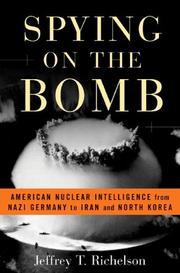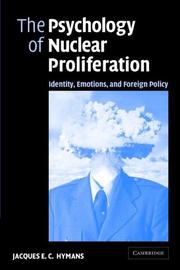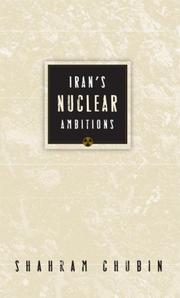| Listing 1 - 7 of 7 |
Sort by
|

ISBN: 0393053830 9780393053838 9780393329827 Year: 2006 Publisher: New York, N.Y. Norton
Abstract | Keywords | Export | Availability | Bookmark
 Loading...
Loading...Choose an application
- Reference Manager
- EndNote
- RefWorks (Direct export to RefWorks)
A global history of U.S. nuclear espionage from its World War II origins to today's threats from rogue states. Since 1952 the nuclear club has grown to at least eight nations, while others are making serious attempts to join. Each chapter chronologically focuses on the nuclear activities of one or more countries, intermingling what the United States believed was happening with accounts of what actually occurred in each country's laboratories, test sites, and decision-making councils. Intelligence scholar Richelson weaves recently declassified documents into his interviews with the scientists and spies involved in the nuclear espionage, revealing new information about U.S. intelligence work on the Soviet/Russian, French, Chinese, Indian, Israeli, and South African nuclear programs; on the attempts to solve the mysterious Vela Incident; and on current efforts to uncover nuclear secrets of Iran and North Korea. Includes spy satellite photographs never before extracted from the National Archives.--From publisher description.
Espionage, American. --- Nuclear arms control --- Nuclear weapons information. --- Nuclear weapons --- Research. --- Nuclear weaponsResearch. --- Espionnage américain --- Information sur les armes nucléaires --- Armes nucléaires --- Espionnage américain --- Information sur les armes nucléaires --- Armes nucléaires --- Polemology --- Contrôle
Book
ISBN: 2200269501 9782200269500 2200356870 Year: 2006 Publisher: Paris : Armand Colin,
Abstract | Keywords | Export | Availability | Bookmark
 Loading...
Loading...Choose an application
- Reference Manager
- EndNote
- RefWorks (Direct export to RefWorks)
Depuis 60 ans, l'arme nucléaire est le symbole suprême de la puissance des États et l'instrument de leur domination sur l'ordre mondial. Dès son invention, l'arme atomique s'est imposée comme un élément central, structurant et fortement stabilisateur des relations internationales. Comment, en plaçant pour la première fois dans la main de l'homme le moyen de sa destruction, elle lui a imposé d'en théoriser (et d'en organiser) la non-prolifération et la non-utilisation. Comment le bombardement d'Hiroshima, s'il a été l'acte de naissance de la Guerre froide, a ouvert une ère de coexistence pacifique. Pourtant, depuis la chute du Mur de Berlin, l'inquiétude renaît. Certains États (tels la Corée du Nord ou l'Iran) ne voient-ils pas dans la détention du feu nucléaire un moyen d'assurer leur existence ou de renforcer leur autorité ? Ou des groupes terroristes celui de soumettre, à peu de frais, l'humanité entière à leurs intimidations ? Aujourd'hui comme hier, l'arme nucléaire constitue un objectif ultime pour les uns, une menace suprême pour les autres.
Nuclear weapons --- Nuclear arms control --- World politics --- Armes nucléaires --- Politique mondiale --- History --- Histoire --- Contrôle --- History. --- Armes nucléaires --- Contrôle --- Nuclear weapons - History. --- World politics - 1945-1989. --- World politics - 1989 --- -Nuclear weapons --- Relations internationales --- 1945-....

ISBN: 9780521616256 9780521850766 0521850762 9780511491412 0511491417 0511146906 9780511146909 0511145888 9780511145889 0511146329 9780511146329 1280431563 9781280431562 9786610431564 6610431566 0521616255 0521616255 0511312490 9780511312496 1107153727 9781107153721 051118400X Year: 2006 Publisher: Cambridge New York Cambridge University Press
Abstract | Keywords | Export | Availability | Bookmark
 Loading...
Loading...Choose an application
- Reference Manager
- EndNote
- RefWorks (Direct export to RefWorks)
Dozens of states have long been capable of acquiring nuclear weapons, yet only a few have actually done so. Jacques E. C. Hymans finds that the key to this surprising historical pattern lies not in externally imposed constraints, but rather in state leaders' conceptions of the national identity. Synthesizing a wide range of scholarship from the humanities and social sciences to experimental psychology and neuroscience, Hymans builds a rigorous model of decisionmaking that links identity to emotions and ultimately to nuclear policy choices. Exhaustively researched case studies of France, India, Argentina, and Australia - two that got the bomb and two that abstained - demonstrate the value of this model while debunking common myths. This book will be invaluable to policymakers and concerned citizens who are frustrated with the frequent misjudgments of states' nuclear ambitions, and to scholars who seek a better understanding of how leaders make big foreign policy decisions.
International relations. Foreign policy --- Polemology --- Nuclear warfare --- Nuclear arms control --- Guerre nucléaire --- Armes nucléaires --- Contrôle --- Guerre nucléaire --- Armes nucléaires --- Contrôle --- Nuclear nonproliferation --- International relations --- Export of nuclear materials --- Export of nuclear technology --- International control of nuclear energy --- Nonproliferation, Nuclear --- Nuclear energy --- Nuclear exports --- Nuclear proliferation --- Proliferation, Nuclear --- Nuclear-weapon-free zones --- Political psychology --- Government policy. --- Psychological aspects. --- International control --- Social Sciences --- Political Science
Book
ISBN: 9138225824 Year: 2006 Publisher: Stockholm Weapons of Mass Destruction Commission
Abstract | Keywords | Export | Availability | Bookmark
 Loading...
Loading...Choose an application
- Reference Manager
- EndNote
- RefWorks (Direct export to RefWorks)
Weapons of mass destruction. --- Nuclear arms control. --- Chemical arms control. --- Biological arms control. --- Armes de destruction massive --- Armes nucléaires --- Armes chimiques --- Armes biologiques --- Contrôle --- 872 Massavernietigingswapens --- 874.1 Regelgeving en controle --- 241 Hedendaagse wereldproblemen --- 255.1 Verenigde Naties --- Armes nucléaires --- Contrôle --- Biological arms control --- Chemical arms control --- Nuclear arms control --- Weapons of mass destruction --- CBRNEs (Weapons) --- CBRNs (Weapons) --- Chemical, biological, radiological and nuclear weapons --- Mass destruction, Weapons of --- NBC agents (Weapons) --- NBC weapons --- Nuclear, biological and chemical weapons --- WMDs (Weapons) --- Nuclear weapons control --- Chemical weapons control --- Biological weapons control --- Military weapons --- Arms control --- Nuclear weapons

ISBN: 9780870032301 9780870032318 0870032305 0870032313 Year: 2006 Publisher: Washington: Brookings Institution
Abstract | Keywords | Export | Availability | Bookmark
 Loading...
Loading...Choose an application
- Reference Manager
- EndNote
- RefWorks (Direct export to RefWorks)
"Iranian-born Shahram Chubin narrates the recent history of Iran's nuclear program and diplomacy, and argues that the central problem is not nuclear technology but rather Iran's behavior as a revolutionary state with ambitions that collide with the interests of its neighbors and the West"--Provided by publisher.
Nuclear weapons --- Nuclear arms control --- Armes nucléaires --- Contrôle --- Iran --- Military policy. --- Politique militaire --- 872 Massavernietigingswapens --- 883.5 Zuid-Azië --- 840 Samenleving en staat --- Nuclear weapons control --- Arms control --- Nuclear weaponsIranMilitary policy. --- Armes nucléaires --- Contrôle --- República Islâmica do Irã --- Irã --- Persia --- Northern Tier --- Islamic Republic of Iran --- Jumhūrī-i Islāmī-i Īrān --- I-lang --- Paras-Iran --- Paras --- Persia-Iran --- I.R.A. --- Islamische Republik Iran --- Islamskai︠a︡ Respublika Iran --- I.R.I. --- IRI --- ايران --- جمهورى اسلامى ايران --- Êran --- Komarî Îslamî Êran
Book
ISBN: 0241143500 Year: 2006 Publisher: London : Penguin books,
Abstract | Keywords | Export | Availability | Bookmark
 Loading...
Loading...Choose an application
- Reference Manager
- EndNote
- RefWorks (Direct export to RefWorks)
Actions unilatérales (Droit international) --- Armes nucléaires--Non-prolifération --- Collectieve veiligheid --- Collective security --- Export of nuclear materials --- Export of nuclear technology --- Export van nucleair materiaal --- Export van nucleaire technologie --- Exportation de matériel nucléaire --- Exportation de technologie nucléaire --- GWOT, 2001-2009 (War on Terrorism) --- Global War on Terror, 2001-2009 --- Guerre contre le terrorisme, 2001-2009 --- Guerre d'Iraq, 2003-2011 --- International security --- Irak--History--Anglo-Amerikaanse invasie, 2003-2011 --- Irakese oorlog, 2003-2011 --- Iraq War, 2003-2011 --- Iraq--Histoire--Invasion anglo-américaine, 2003-2011 --- Iraq--History--Anglo-American Invasion, 2003-2011 --- Kernwapens--Non-proliferatie --- Matériel nucléaire--Exportation --- Non-proliferatie [Nucleaire ] --- Non-proliferatie van kernwapens --- Non-prolifération d'armes nucléaires --- Non-prolifération nucléaire --- Nonproliferation [Nuclear ] --- Nucleair materiaal--Export --- Nucleaire grondstoffen--Export --- Nucleaire non-proliferatie --- Nuclear exports --- Nuclear nonproliferation --- Nuclear proliferation --- Nucleire technologie--Export --- Oorlog tegen het terrorisme, 2001-2009 --- Proliferatie [Nucleaire ] --- Proliferation [Nuclear ] --- Prolifération nucléaire --- Security [Collective ] --- Security [International ] --- Sécurité collective --- Sécurité internationale --- Technologie nucléaire--Exportation --- Unilateral acts (International law) --- Unilaterale acties (Internationaal recht) --- Veiligheid [Collectieve ] --- War against Terrorism, 2001-2009 --- War on Terror, 2001-2009 --- War on Terrorism, 2001-2009 --- Bush, George Walker --- United States --- Foreign relations --- 2001-2009 --- Politics and government --- Bush, George Walker, 1946 --- -Unilateral acts (International law)
Book
ISBN: 9002219725 9789002219726 Year: 2006 Publisher: Antwerpen Standaard Uitgeverij
Abstract | Keywords | Export | Availability | Bookmark
 Loading...
Loading...Choose an application
- Reference Manager
- EndNote
- RefWorks (Direct export to RefWorks)
Criminology. Victimology --- Political sociology --- Belgium --- Armes nucléaires --- Kernwapens --- Terrorisme --- Nuclear terrorism --- Terrorism --- #SBIB:327.5H21 --- #SBIB:324H72 --- BPB0606 --- 343.34 --- 623.45 --- Vrede – oorlog, oorlogssituaties --- Politieke verandering: conflictlijnen, nationalisme/federalisme --- Munitie. ABC-wapens --- 343.34 Terrorisme --- Acts of terrorism --- Attacks, Terrorist --- Global terrorism --- International terrorism --- Political terrorism --- Terror attacks --- Terrorist acts --- Terrorist attacks --- World terrorism --- Direct action --- Insurgency --- Political crimes and offenses --- Subversive activities --- Political violence --- Terror --- Qaida (Organization) --- Qāʻidah (Organization) --- Quaida (Organization) --- Al-Qaida (Organization) --- Qaeda (Organization) --- International Islamic Front for Jihad Against Jews and Crusaders --- Islamic Salvation Foundation --- Group for the Preservation of the Holy Sites --- Islamic Army for the Preservation of Holy Sites --- Islamic Army for the Preservation of the Holy Places --- Al Qaeda (Organization) --- Al Queda (Organization) --- Alʹ-Kaida (Organization) --- Kaida (Organization) --- R̄ekxirawî Elqaʻîde --- Elqaʻîde (Organization) --- تنظيم القاعدة --- قاعدة (منظمة) --- Al-Qaedah (Organization)
| Listing 1 - 7 of 7 |
Sort by
|

 Search
Search Feedback
Feedback About UniCat
About UniCat  Help
Help News
News